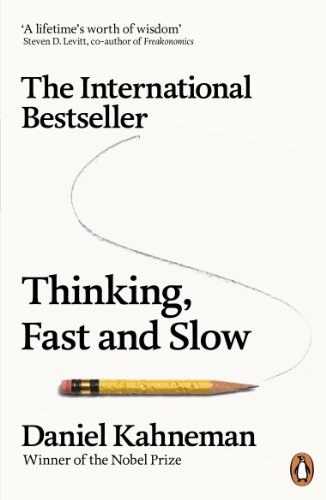
《Thinking, Fast and Slow》速思速行解读脑海奥秘
1
0

坚强的小蚂蚁 2023-09-09 07:12:47
1. Thinking, Fast and Slow
2. Base rate fallacy
3. Bayesian calculator
4. Less is more - joint fallacy
5. People tend to infer general from particular rather than deduce particular from general
6. Causal relationship than statistical significance
7. Risk of correcting system 1 (i.e. in VC)
8. Outcome bias
9. Educated guess no better than blind guess
10. When should we use formula (low validity environment, simple formula works better than complicated ones)
11. When can we use expert intuition (stable/regular environment)
12. Planning fallacy (outside view), optimism
13. Sunk cost fallacy
14. Bernoulli Utility Theory (no reference point)
15. Prospect Theory (adaptation level, diminishing sensitivity, loss aversion)
16. Endowment Effect (reference point, history matters)
17. Our brains always give priority to bad news. Not achieving a goal is a loss, exceeding the goal is again.
18. Fourfold Pattern (overweight low prob - possibility effect, underweight high prob - certainty effect)
19. Rare events (decision weight vs probability)
20. Risk policy (broad framing by considering a set of choices rather than looking at choices separately)
21. It is more painful if things go bad by deviating from default and by action (than non-action)
22. Single evaluation vs joint evaluation
23. You are more attached to description of reality rather than reality itself
24. Memory can be wrong due to duration neglect and the peak-end rule
25. I am the remembering self rather than experiencing self. Traveling is to construct stories and collect memory.
26. Life evaluation and life experience are different
27. Focus illusion is the source of miswanting. The mind is good with stories but not processing of time.
相关推荐
萤火谷的梦想家
艾莉森•麦吉出生于1960年,是美国《纽约时报》畅销书作家,同时也是大都会州立大学创意写作课的教授。她的作品被翻译成20多种语言并出版,也曾被提名普利策奖,并获得苏斯博士奖金奖、克里斯托弗图书奖、美国 [美]艾莉森•麦吉/[美]克里斯托弗•丹尼斯/绘 2023-03-27 16:50:25鬼马女神捕1·绝密卧底(上)
腹黑凤凰vs毒舌鸡妖——蓝翎:“小姬,跟我去人界吧!”姬十四:“干吗?让人宰了我做小鸡炖蘑菇吗?”蓝翎:“不啊,让妖怪宰了你做小鸡炖蘑菇更气派。”凤凰蓝翎和鸡妖姬十四生活在无忧无虑的灵界。他们的故乡叫 郝天晓 2023-04-17 00:22:47© 2023-2025 百科书库. All Rights Reserved.












发表评价